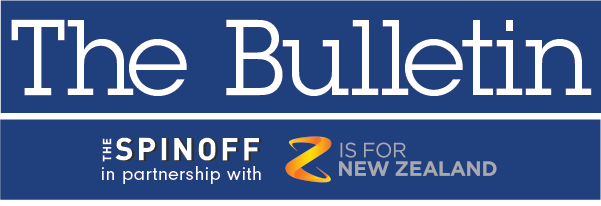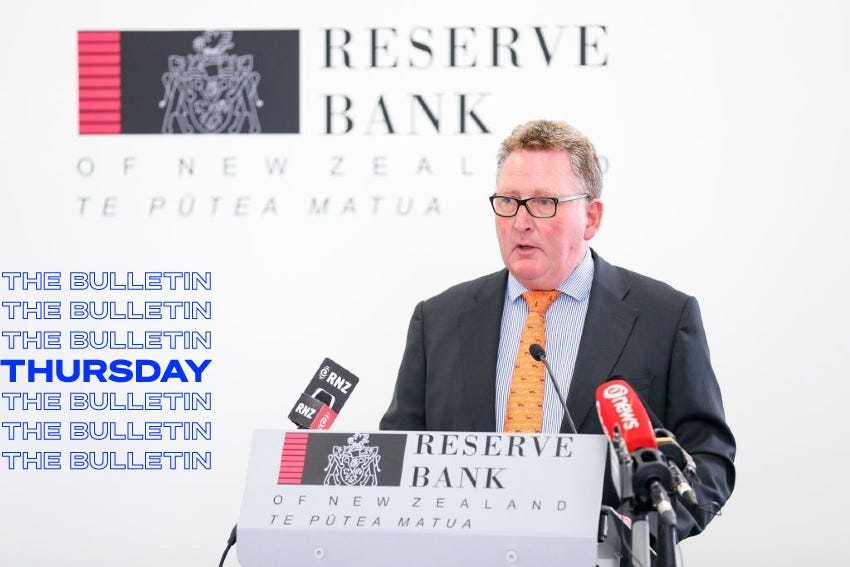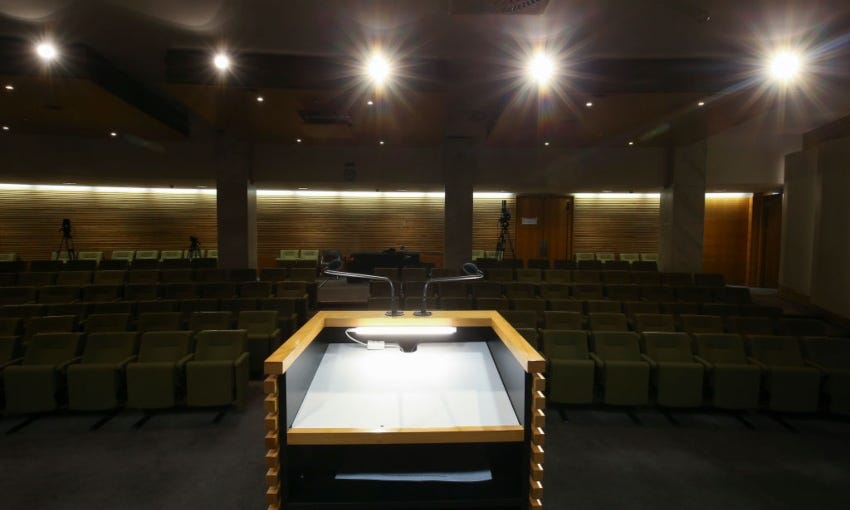Reserve Bank hikes borrowing costs, warns of more to come
New Zealand's central bank has moved ahead of nearly all developed economies by increasing rates despite delta hazards
Mōrena and welcome to The Bulletin for Thursday, October 7, by Justin Giovannetti. Presented in partnership with Z Energy.
In today’s edition: The country’s 28th Covid death; confusion continues around new virus restrictions; power prices to stay high; but first, the Reserve Bank’s big move.
Reserve Bank governor Adrian Orr (Hagen Hopkins/Getty Images)
The cost of borrowing is going up for the first time in seven years. The Reserve Bank increased the official cash rate yesterday from a record low 0.25% to 0.5%, a move that had been widely expected by economists and which will cool the economy in the coming months. Whether it impacts the housing market, as intended, remains to be seen. As Stuff reports, banks announced within minutes that they were increasing interest rates on home loans and savings accounts. More increases from the Reserve Bank are expected in the coming years that could push mortgage rates well above 5%.
What purpose does the official cash rate serve? It’s the main way the Reserve Bank controls the speed of the economy. Back in 2014, it was at 3.5% when the central bank wanted people to save more and spend less. It’s been going down since then. Practically, it’s the rate charged on overnight borrowing between banks — there’s a lot of cash moving around the financial system to make it work. Banks then pass the costs on to you, fellow consumer.
The hike comes at an awkward time. The Reserve Bank was planning to announce the increase in August, but that was delayed by the delta outbreak. Despite one-third of the country being in lockdown, Covid spreading and the elimination strategy being abandoned earlier this week, the central bank said nothing had really changed and it simply unpaused the August decision. Based on the government’s economic support last year, the central bank said it expected businesses to be cushioned from the impact of ongoing restrictions. “Near-term growth will remain volatile and will depend on the speed and extent to which public health restrictions are eased,” the central bank’s monetary policy committee noted. Based on the massive question mark that is Covid-19, Interest reports that the economic crystal ball is murky going forward.
There was no real case for delay. As the NZ Herald (paywalled) explains, the Reserve Bank pretty much had to do it because everyone expected it. The central bank also revealed that it’s concerned about inflation pushing 4% in the short-term, especially with a tight labour market and an unhealthy rise in house prices. While higher inflation is a global phenomenon, New Zealand is ahead of nearly all other developed economies with this move. Most have signalled they won’t move for some time. Australia’s central bank just held its rate at 0.1%. Economists told One News that they expect an increase next month as well in New Zealand, followed by another in early 2022. A fourth hike could be on the cards after that. According to RNZ, mortgage brokers had expected the rise and they think it’ll take a lot more to put off home buyers.
A special note from The Spinoff publisher Duncan Greive: Without wanting to get too Bernie Sanders-meme with it, I am once again asking you to consider donating to help The Spinoff in its hour of need.
The delta outbreak struck just as we had made a major investment in new hires to grow what we can bring you on The Spinoff. We now have a head of data creating powerful charts to map the spread of the virus and rollout of the vaccine, a CTO to rebuild our site and upgrade our security and multiple brilliant new writers and editors like Reweti Kohere, Madeleine Holden and Chris Schulz. They are all creating important work under highly constrained circumstances — as are the rest of our 20-strong editorial team. Unfortunately delta has had a significant impact on our partnership work, which makes us more reliant than ever on the support of our audience.
So — if you're part of The Spinoff Members, thank you, from all of us. If you're not, and can donate, please do so today using this link — to keep on keeping on, we need you right now.
(A reminder: Every dollar donated through The Spinoff Members is ring-fenced to create more of our homegrown and independent journalism.)
A difficult day in New Zealand's Covid response. The country's 28th Covid-related death was recorded yesterday and 39 more cases were detected, including nine in Waikato. The number of new cases and the percentage active in the community while infectious continues to climb two weeks after Auckland left level four lockdown. Waiheke Island and Great Barrier are now closed to non-residents. The government has asked people to consider only a three week gap between jabs, reversing earlier advice to wait six. The Spinoff's live updates covered that news, along with a letter from Pfizer suggesting it was keen to start negotiations earlier with New Zealand to purchase its vaccine.
Confusion continues around new restrictions. No, you can’t use your friend’s bathroom, but you can meet nine friends if you’re all going out for yoga. I asked about using the loo at Monday’s press conference as an example of the complexity of the new rules. I never expected it to get this complex. The prime minister, director-general of health and deputy prime minister have all given conflicting advice over the past two days on toilet use (the PM’s reckons are now the official word), as the NZ Herald reports. The confusion extends into level two, where Monday’s spoken advice was that a 100 person cap was being lifted on hospitality. However, in written form it was also taken off events, opening up the potential for hundreds to attend theatres or thousands in stadiums, according to Stuff.
The Covid numbers: 30 new community cases were reported yesterday in Auckland and 9 in Waikato. 79% (19) of the previous day’s total were in the community while infectious. There are now 335 active cases. 63,624 people were vaccinated on Tuesday.
The Spinoff’s Covid data tracker has the latest figures.
Electricity prices could remain high for years, Meridian warns. The company says gas shortages and the need to spend up to $10 billion over the next decade to build new renewable power will keep rates high, Stuff reports. While residential customers haven’t faced the full cost of increases over recent months, industry has and some manufacturers have cut back on production due to high bills. There will be an interesting debate in the coming months about when the country can shutter its coal and gas burning power generation as climate change targets get closer and tougher.
Some of the country's poorest tenants can’t get a government subsidy because of who their landlord is: Wellington city council. The capital is the country’s second largest landlord but its 3,500 tenants are excluded from a government subsidy that most would otherwise be eligible for. According to the Dominion Post, it would cost $13.2 million annually to drop rents to 25% of a tenant’s income like other social housing tenants in the country, some are now paying up to 60% or higher. Despite the higher rents, the capital’s housing arm could be insolvent by June 2023.
A tiny candy-stick coloured pygmy pipehorse discovered off New Zealand has been given a name. In what The Guardian reports is likely a world-first by an indigenous group, the creature has been formally given a Māori name. It’ll now be called the Cylix tupareomanaia, the second half of the name means “the garland of the manaia”. A manaia is the Māori name for a seahorse. It’s a meaningful move, especially in the area where the little swimmer lives.
Got some feedback about The Bulletin, or anything in the news?
Get in touch with me at thebulletin@thespinoff.co.nz
The Beehive theatrette viewed from the other side. (Hagen Hopkins/Getty Images)
Right now on The Spinoff: Lara Greaves reports that Māori risk being left behind in the vaccine push and Māori experts have been all but invisible in the government response. Shanti Mathias, in the latest instalment of IRL, explores what it means for religion to go online during lockdown. Michael Plank writes that no longer aiming for zero doesn't mean we are waving the white flag. Justin Latif explains that for many Pacific youth, family time is the key to dealing with lockdown. Jesse Mulligan has learned quite a lot from anti-vaxxers in his DMs and wrote this strong take about it.
For a longer read today, how industry has skewed the science on deep-sea mining. Following a Supreme Court decision on seabed mining last week, the industry is now at the centre of debate in parliament with a call to ban it completely in New Zealand waters. Mongabay reports that the high cost of studying deep-sea ecosystems means that scientists need to rely on funding from mining companies for access. The deal creates an ethical minefield and much of the data created isn't being shared openly. Here’s a sample:
Scientists are still trying to fathom the depths of our oceans, both to understand the sensitive ecosystems that thrive there, and the minerals that can be extracted from polymetallic nodules that have formed over millennia. Less than 1% of the deep sea has been explored. The interest in exploiting ocean minerals is coupled with advancements in scientific research…
For baseline research, “if this fundamental first-time characterization of these ecosystems is going to be done, it should be done by experts, so there’s quality assurance,” Levin said in a lecture in 2018 on the ethical challenges of seabed mining. “You’re damned if you do and damned if you don’t at some level.”
Head injuries aren't slowing play in the NRL. The Bounce reports that there’s a “game of Russian roulette” going on as the league plays on with head injuries and players that look dazed after hits. The way teams deal with players after they fail head injury assessments is deeply problematic and should send chills down your spine, writes Dylan Cleaver.
That's it for The Bulletin. If you want to support the work we do at The Spinoff, please check out our membership programme.







